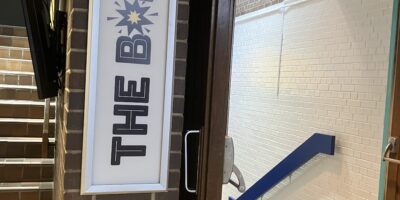Hello Everyone!
Here we are, another newspaper out on the stands, another couple of weeks gone. Thanks to all my wonderful writers, this issue is jam packed with tons of exciting things! I’ve been faced with the happy problem of having too many articles to fit into the newspaper! The copy editors and layout whizzes make all of this possible! So thanks everyone!
This school term has certainly gotten going with a vengeance. Between assignments, interviews and midterms I have been kept quite busy. On top of that there is the added fun of making family plans for the Thanksgiving weekend. This year, my sister is off milking cows in New Zealand, so our family unit is greatly diminished in size.
The fact that she is over there instead of being in Guelph in the midst of her second year studying Agricultural science is in itself a point of contention. Getting a university education has always been important to my parents because they insist that it teaches you how to think about and approach problems. Initially when my sister found out about the job abroad my parents offered to pay her plane ticket – if she came back in time to start the Fall semester. Ultimately they are still paying for her flight, but she has managed to wrangle a break from a full year of school.
This week I want to talk about people whose educations did not flow smoothly from high school to University. We’re going to start out with one of my oldest classmates, someone with greying hair whose entire childhood took place pre-internet. (“What is the facebook?”)
I first met Jim in 1A. The Chem Eng’s were practically living in Bio 1, and Jim and I tended to take the seats on the outside where you had more space to stretch out. (Picture the old RCH 101 seating, but worse.) Jim is a big relatively muscular guy and at first few of us wanted to approach him. Why was this old guy in our class? Over time, however, the shared stress of engineering classes got us to discussing class things. Was our Linear Algebra prof actually speaking English? We definitely had not learned this craziness in elementary school as he kept insisting!
The phrase “Explain it to me like I’m a four year old” became very common to hear from Jim. It helps that he had a four year old at home, so he knew exactly what he was asking. By the end of 1A, I was completely lost in Linear Algebra, so I made a trade he couldn’t refuse. If he would give me a copy of his notes, I would baby sit his two kids so he and his wife could get out and do something fun! Thanks to those notes I passed the course, and I got the added bonus of getting to play Lego with his kids. A definite win-win!
Now you might be asking, why is he here now? Why put yourself through the pains of studying engineering when you could do business or a more practical college course with considerably less of a time requirement? For an in depth answer you’ll have to ask Jim himself. Perhaps what it comes down to is that not all of us have it together when we first leave high school. For Jim, it wasn’t the brains that he needed, but the perseverance.
After brief adventures in the United States, Jim returned to Canada to partake in what most parents might consider to be the logical next step for an unruly child, the military. So Jim began his first career as a military man serving in the Canadian Forces. I presume he had many adventures over his time in the army, and he saw the inside of many foreign bases including Italy and Germany.
All good things come to an end however. In Jim’s case, a training accident where the vehicle he was riding in the back of flipped caused him to be medically discharged. The Infantry is great for teaching you to survive enormous hikes with huge packs, being dropped from planes and numerous consecutive hours of mind numbing boredom. However, it doesn’t really set you up for a civilian job afterwards.
So he worked in construction type jobs as a labourer. I’m not entirely sure what the progression was but inevitably while his kids were small (they still are, let’s be honest), Jim redid the necessary high school courses and applied to Chemical Engineering at UW!
Life as a mature student is certainly different. Jim and his wife own a house and a car, they have old friends who visit them and neighbours that they want to maintain friendships with. They take their kids to museums and Zoo’s on the weekends. Jim’s wife works the typical 9-5 workday so when kids are sick or daycare has unexpectedly closed, they have to work it into their schedules, even if it’s the day of an exam. It’s a scheduled life, much more than mine, that’s for sure!
It is a brave thing to restart, more so when you have a lot riding on your success. Our education is an investment into our future and that of whatever family and dependents we end up having. As a twenty something, this is a time for messing up and learning about ourselves. We are investing in our futures, but we aren’t committing to them.
That brings me around to the money side of things. Engineering tuition and fees are expensive! OSAP looks at assets like owning a house and a car when it is determining your funding eligibility. It is argued that you don’t truly need help paying for school until all of those other assets have been liquidated. Not qualifying for OSAP takes away the potential to receive certain bursaries and disqualifies you from certain jobs. It is similar to how the welfare system works, where they won’t help people get back on their feet until the person has lost all their material wealth. Having lost everything, including assets like their car and/or house, greatly magnifies their struggles in getting back on their feet. In Jim’s case, he initially received OSAP only to have it taken back from him, which was a challenge.
Co-op jobs are also impacted by being a full time student AND a full time dad. You can’t just apply anywhere when you have kids and a house. Especially applying to jobs in first year, it’s challenging to be limited to the greater KW area. Heck, even applying any and everywhere, it’s pretty tough getting hired. Although Jim has superior soft skills, he was just a green to lab work as the rest of us!
Going to post secondary when you are well out of your 20’s is definitely different from doing it fresh out of high school. True, you are older and wiser than you were, and possibly more disciplined as well. However, you lose out on the parental safety blanket many of us enjoy; you can’t afford to mess up and do over as much. The education system is really aimed at us young 20 something’s, but in reality you never really stop learning and it’s a fact that we shouldn’t forget.
The second person I’m going to mention, albeit briefly, is my grandfather. Growing up in the small town of Lukavec, Czech Republic in the 1930’s, he was privileged to be the son of a high school principal. Although he missed a year or so of High School at the height of the war, his education progressed fairly normally. However, in early 1949 the communist party fully came to power. With this power shift, my grandfather’s university career was stopped abruptly. Part way through his second year, his energies were forcibly redirected to more physical labours like tending fields. He was kicked out not for bad conduct or bad grades, but for the simple reason that Intellectuals, like school principals, were not looked upon favourably in the soviet occupied country.
In the years that followed, he ran across the border in the dead of night, worked on jeeps in an American run refugee camp and even attended Masaryk University for Czechoslovakia students in exile. He was bounced around to countries like Sweden and Denmark. Eventually he arrived in Canada. It was 1951, almost three years since he was studying in his home country. After learning English, he enrolled at U of T for the final year of his Mechanical Engineering degree.
It’s tough to say what might have happened to my grandfather if he hadn’t made it to Canada, where he was able to become a citizen and put down new roots. At the time, being a refugee in Europe was not terrible. Although food and shelter could be scarce, there was a large emphasis on rehabilitation. Many families opened their homes so that my grandfather could stay with them and attend school.
Ultimately, all this time and effort that we put in to school culminates with a piece of paper. Not having that piece of paper does not devalue your contributions to society as a whole. Whether you did university or college or went directly into the workforce, you will always be learning. However, that piece of paper does signify the dedication and discipline it took to really learn about your topic of study. The countless hours spent sitting with textbooks or working a part time job to pay for all of it, all becomes worthwhile.
As midterms and interviews intensify, all I can really do is wish you luck. If not now, I know you will get it someday!




Leave a Reply